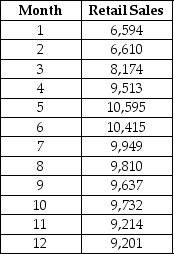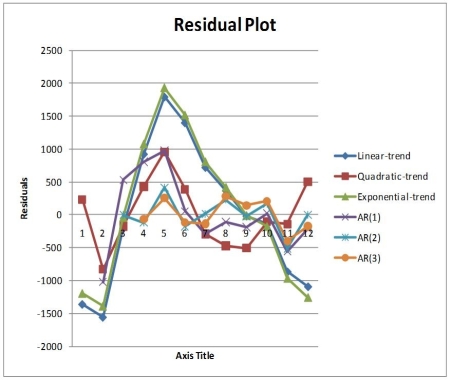TABLE 16-13
Given below is the monthly time-series data for U.S.retail sales of building materials over a specific year.  The results of the linear trend,quadratic trend,exponential trend,first-order autoregressive,second-order autoregressive and third-order autoregressive model are presented below in which the coded month for the 1st month is 0:
The results of the linear trend,quadratic trend,exponential trend,first-order autoregressive,second-order autoregressive and third-order autoregressive model are presented below in which the coded month for the 1st month is 0:
Linear trend model:  Quadratic trend model:
Quadratic trend model:  Exponential trend model:
Exponential trend model:  First-order autoregressive:
First-order autoregressive:  Second-order autoregressive:
Second-order autoregressive:  Third-order autoregressive:
Third-order autoregressive:  Below is the residual plot of the various models:
Below is the residual plot of the various models: 
-Referring to Table 16-13,what is the exponentially smoothed value for the 12th month using a smoothing coefficient of W = 0.5 if the exponentially smooth value for the 10th and 11th month are 9,746.3672 and 9,480.1836,respectively?
Correct Answer:
Verified
Q121: TABLE 16-13
Given below is the monthly time-series
Q126: TABLE 16-13
Given below is the monthly time-series
Q129: TABLE 16-12
A local store developed a multiplicative
Q130: TABLE 16-12
A local store developed a multiplicative
Q133: TABLE 16-12
A local store developed a multiplicative
Q133: TABLE 16-13
Given below is the monthly time-series
Q134: TABLE 16-13
Given below is the monthly time-series
Q135: TABLE 16-13
Given below is the monthly time-series
Q136: TABLE 16-13
Given below is the monthly time-series
Q137: TABLE 16-12
A local store developed a multiplicative
Unlock this Answer For Free Now!
View this answer and more for free by performing one of the following actions

Scan the QR code to install the App and get 2 free unlocks

Unlock quizzes for free by uploading documents